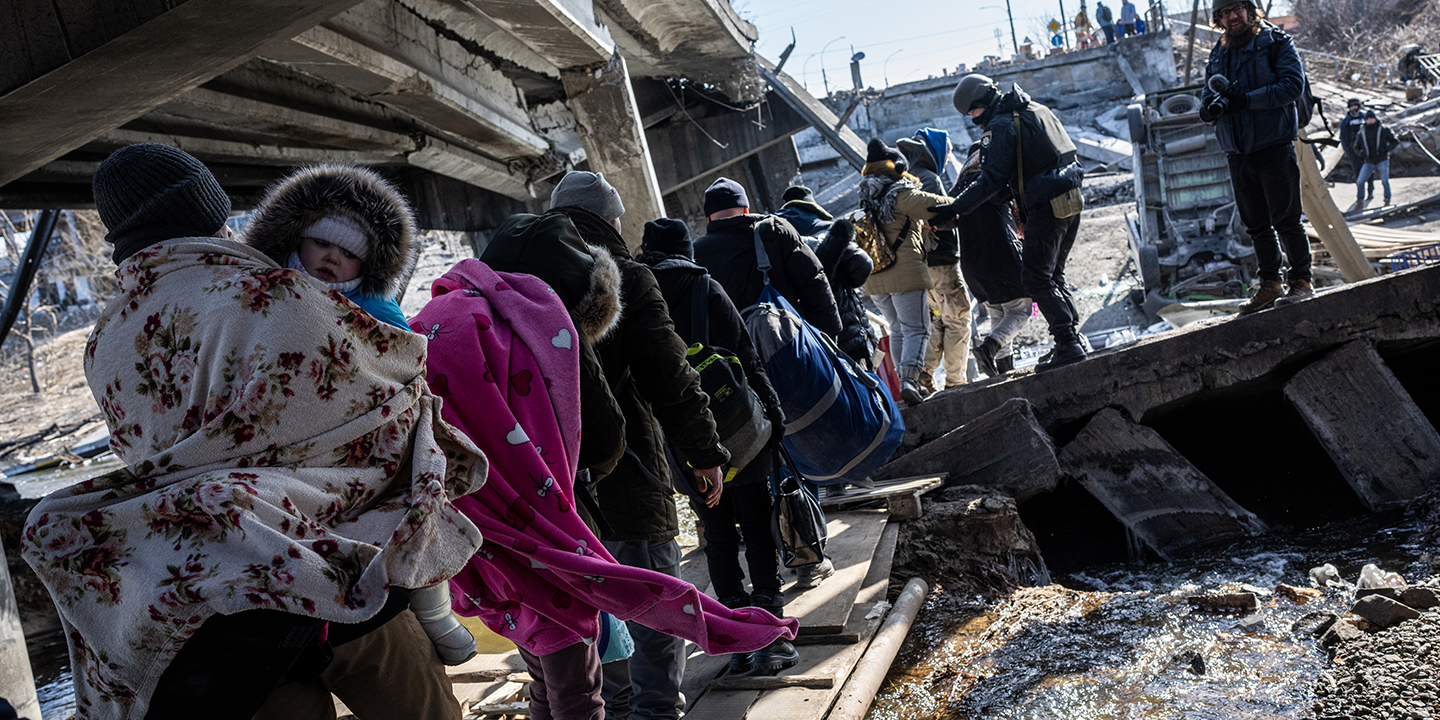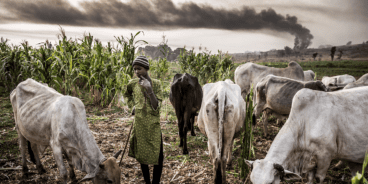

Atrocity Alert No. 292: Ukraine, Sudan/South Sudan and Ethiopia
Atrocity Alert is a weekly publication by the Global Centre for the Responsibility to Protect highlighting situations where populations are at risk of, or are enduring, mass atrocity crimes.
‘UKRAINE IS ON FIRE’ AS RUSSIA CONTINUES TO TARGET CIVILIANS AND CIVILIAN OBJECTS
As the Russian invasion in Ukraine enters its fourth week, civilians continue to suffer the devastating consequences of the violence. Despite multiple ceasefire agreements and attempts at humanitarian corridors for civilians, artillery and missile strikes have continued and are increasingly targeting civilian infrastructure. Civilians fleeing Russian occupied territory have reported that Russian troops have targeted and killed civilians, as well as looted markets and homes. On 14 March UN Secretary-General António Guterres stressed that, “Ukraine is on fire… the country is being decimated before the eyes of the world. The impact on civilians is reaching terrifying proportions. After being hit by Russian forces, roads, airports and schools lie in ruins.”
The World Health Organization has warned that Ukraine’s medical facilities are “stretched to the breaking point” and has verified at least 43 attacks on healthcare since the invasion started on 24 February. These attacks have killed at least 12 people, including healthcare workers, and have destroyed critical health infrastructure. On 9 March a Russian strike that targeted a hospital complex in Mariupol destroyed the hospital’s maternity and children’s ward, burying women and children in the rubble. Attacks on civilians, civilian infrastructure and healthcare are forbidden under international law and may amount to war crimes and crimes against humanity.
Since the invasion, the Office of UN High Commissioner for Human Rights has verified at least 726 civilian deaths, including 52 children, while asserting the real toll is much higher. Over 3 million people have fled to neighboring countries and at least 1.9 million are internally displaced, while hundreds of thousands remain trapped by fighting. According to the UN Children’s Fund, at least one child per second is becoming a refugee due to the war.
Secretary-General Guterres and others have also warned of the worldwide impact of the conflict and the strain it will impose on aid efforts globally. More than half of the World Food Programme’s wheat supply is provided by Russia and Ukraine. Increasing scarcity and costs will impede aid operations for vulnerable populations at risk of famine in Yemen and Ethiopia and those facing food insecurity elsewhere.
Today, 16 March, the International Court of Justice imposed provisional measures, calling on Russia to suspend military operations and for military units to cease advancing. It also calls on both parties to refrain from actions furthering the conflict. Sarah Hunter, Communications and Digital Media Officer at the Global Centre for the Responsibility to Protect, said that, “in keeping with these provisional measures, Russia must cease hostilities and parties to the conflict should urgently agree and adhere to a cessation of hostilities allowing for the delivery of humanitarian aid and evacuations of besieged civilians.”
RENEWED INTER-COMMUNAL VIOLENCE IN DISPUTED SUDAN AND SOUTH SUDAN BORDER REGION
Since 10 February violence has renewed between the Ngok Dinka and Misseriya Arab communities in the Abyei Area – a disputed border region between Sudan and South Sudan – as a result of unresolved grievances and longstanding disputes. According to the Relief and Rehabilitation Commission and Abyei Administration, inter-communal clashes erupted on 10 February in the Anet settlement, killing 20 people and displacing 70,000. The UN Office for the Coordination of Humanitarian Affairs reported that violence has further intensified since 5 March, with at least 36 people killed and an estimated 50,000 displaced following clashes in Agok town. Humanitarian operations have been suspended in conflict-affected areas.
The UN Interim Security Force for Abyei (UNISFA) voiced its concern regarding the renewed violence, stating that the casualties and ongoing insecurity are “causing untold humanitarian suffering on the people as well as reversing gains made towards achieving peaceful coexistence in Abyei.”
Abyei is traditionally the homeland of the Ngok Dinka community, which has strong ties to the Dinka in South Sudan. Misseriya Arab herders and their cattle seasonally traverse Abyei in search of water and grazing land during the dry season. For decades, these communities have competed over resources, sparking cycles of violence that have been exacerbated by climate change and severe droughts. The situation in Abyei has been further affected by years of disputes and clashes between Sudanese and South Sudanese armed forces over the region’s borders and access to oil and other resources.
The clashes in Abyei are occurring while inter-communal and localized violence has increased throughout South Sudan. During February the UN Human Rights Council (HRC)-mandated Commission on Human Rights in South Sudan (CHRSS) reported that “violence at [the] subnational level remains pervasive.” The UN Mission in South Sudan and UN Human Rights Office also recently reported on grave human rights violations perpetrated by warring groups in Western Equatoria State between June and September 2021, including at least 440 civilians killed, 74 abducted and 64 subjected to conflict-related sexual violence.
In order to break the cycles of violence, the South Sudanese government should urgently address the long-standing delays in implementing the 2018 peace agreement, including the security arrangements and the permanent constitution-making process. During the current HRC session, member states must extend the full mandate of the CHRSS.
The governments of Sudan and South Sudan must lend their political support to UNISFA and call for the immediate cessation of violence in the Abyei Area. The Ngok Dinka and Misseriya communities should return to dialogue and peacefully settle disputes concerning the shared use of resources. During the upcoming mandate renewal for UNISFA, the UN Security Council should integrate climate-related security risks by mandating the Mission to develop climate-sensitive conflict responses.
ETHNIC TARGETING ON THE RISE WHILE THE WAR IN NORTHERN ETHIOPIA CONTINUES
On Thursday, 3 March, 11 people were killed in Metekel Zone, in the Benishangul-Gumuz region of Ethiopia. The Ethiopian Human Rights Commission (EHRC) reported that security forces wearing federal government fatigues and members of ethnic and/or regional militias carried out the killings. According to the EHRC, the perpetrators shot dead eight ethnic Tigrayans and two ethnic Gumuz men, accusing them of orchestrating an attack on a civilian convoy a day prior that resulted in the deaths of at least 53 people. Another ethnic Tigrayan man was found by security forces and burned alive. A video of the incident prompted the Ethiopian government to respond, vowing an investigation. Ethnic profiling of Tigrayans has notably increased across the country following the outbreak of war in the Tigray region in November 2020.
Inter-communal tensions and ethnically-motivated attacks have been rising throughout Ethiopia since 2018, particularly in Metekel Zone. Cycles of ethnic violence in Metekel Zone have resulted in at least 1,000 fatalities since 2018, according to the Armed Conflict Location and Event Data Project. Unnamed armed groups typically perpetrate the attacks, however, local ethnic Gumuz militias and other ethnic militias have at times been responsible. Ethnic Amhara and Agew civilians are frequently targeted, as well as indigenous Shinasha people. Responding to the recurrent violence, the federal government declared a state of emergency in Metekel Zone on 23 January and took over security in the area. Since then, federal security forces have been accused of killing ethnic Gumuz civilians.
Meanwhile, parties to the conflict in the Afar, Amhara and Tigray regions continue to perpetrate widespread abuses that amount to possible war crimes and crimes against humanity. The Office of the UN High Commissioner for Human Rights (OHCHR) received over 306 reports of rape by Tigrayan forces in the Amhara region between 1 November and 5 December. According to a report released by the EHRC on 11 March, at least 750 people were killed in Amhara and Afar between September and December 2021. OHCHR also documented 300 civilians killed by the federal government’s aerial bombardments in the Tigray region between 28 November and 28 February. Over 5,700 schools and healthcare facilities in Amhara and Afar have been totally or partially destroyed.
Authorities must urgently address the root causes of inter-communal and ethnic conflicts in Metekel Zone and other parts of Ethiopia. A military solution alone will not end inter-ethnic violence. All parties to the conflict in northern Ethiopia must agree to negotiations and find a resolution to prevent further suffering.
Related Content


Atrocity Alert No. 444: Nigeria, Haiti and South Sudan
